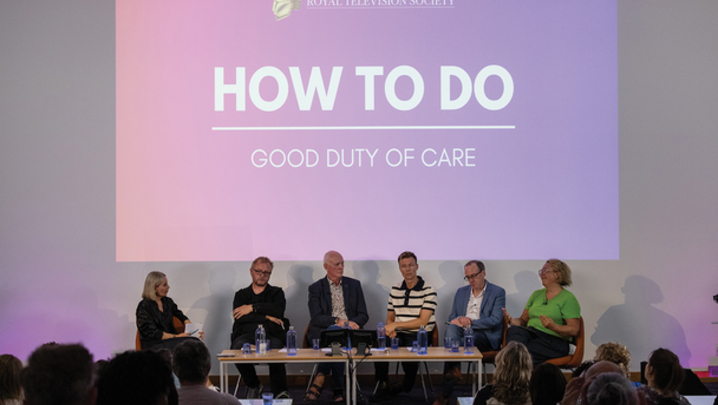The creator and three of the cast of Call the Midwife discuss the secrets of the BBC drama’s extraordinary longevity.
I can’t believe it’s been 10 years,” said Helen George, who plays Nurse Trixie Franklin in Call the Midwife. “It’s been a fantastic ride, from not knowing if it was going to be more than six episodes to here – 10 years later.”
Rare is the TV drama that makes it to its tenth series. But, since the programme detailing the ever-eventful happenings at the nursing convent of Nonnatus House first appeared on 15 January 2012, it has become a Sunday-evening staple.
The series offers a glimpse of yesteryear London via the microcosm of nurses, nuns and soon-to-be mums, with their values and impositions reflecting the evolving society around them.
Its longevity was the topic of discussion at the RTS event “Comfort and challenge: celebrating 10 years of Call the Midwife”.
The secret of its success, according to George, was that, while it was originally based on the memoirs of Jennifer Worth, the show’s creator and writer, Heidi Thomas, continued to have “this magnificent way of reflecting what’s going on… politically and medically back to Nonnatus House in the 1960s. It makes us all realise that we’re going around in circles slightly, and that things sometimes progress, but sometimes they don’t.”
The three actors on the panel – George, Jenny Agutter, who stars as Sister Julienne, and Leonie Elliott, who plays Lucille Anderson – each presented a clip that, in their view, encapsulated the spirit of Call the Midwife.
Demonstrating her point, George’s clip was from the finale of the last series, in which Trixie makes an impassioned plea to keep Nonnatus House in public service by reading out the names of 117 women who it had helped.
“It seems so relevant today to list those names, when, on the anniversary of Covid, names were listed in exactly the same way. This was filmed way before Covid, but Heidi has this sixth sense to be able to predict,” said George.
“And the symbolic nature of that unity of nurses who are sat opposite a bench of suited men felt a relevant parallel to the Government and the NHS at the moment. It’s an ongoing conversation, which I don’t think has had an end since Clement Attlee started the NHS all those years ago.”
Set in Poplar during the late 1950s and early 1960s, Call the Midwife hasn’t shied away from emotive and divisive topics in its depiction of women’s health, the slow advance of society, and life and death. The pill, abortion, teen pregnancy, romance and religion have all been examined.
The thalidomide scandal is a case in point, and was the subject of Thomas’ chosen clip. In the 1950s, the drug was released without being tested properly on pregnant women and used as a treatment for morning sickness.
But it caused defects and fatalities in an estimated 10,000 newborns worldwide before campaigners began questioning the drug’s impact. Call the Midwife introduced a storyline involving thalidomide at the end of the fourth series and continued it beyond.
Covering it “made me realise the power of Call the Midwife, and also the responsibility,” said Thomas, giving an insight into the thinking behind her writing of the story.
“The thalidomide community have an informal saying: ‘Nothing about us without us’, and, once it became known in the press that we were going to cover this story, we were contacted from many directions, and we really made a point of hearing those voices.
“Because we are a popular drama, we could not only reach a large audience, create conversations and provoke memory with this story, but we were able to do something no documentary could do and go behind the delivery-room door. That was a privilege and a responsibility that I didn’t want to shirk.”
Given the influence of Call the Midwife, which regularly draws eight million viewers, Jenny Agutter suggested the topic of cystic fibrosis to Thomas. It was a subject close to Agutter’s heart as the genetic condition runs in her family.
The awareness that the programme brought was significant: “After the episode was shown, the Cystic Fibrosis Trust had more hits on its website than it had ever had,” Agutter said.
The show isn’t only about the big topics, but the little moments, too. Agutter’s clip was Chummy (played by Miranda Hart) painting her mother’s nails with care and love. “It’s such a simple moment and that’s what’s extraordinary,” she explained.
For Leonie Elliott, playing Lucille Anderson gave her the opportunity to represent the Windrush generation within Britain’s medical community – no pressure, then.
“That [representation] was important. One of my favourite moments is when Lucille finds her church,” she said. “It was an experience that my grandad and a lot of my mum’s cousins had – they were christened in living rooms and they would have services in the living room.
“It’s important for anyone to find their community, but it felt extra special because it spoke to how my family found their community when they came to England.”
Elliott’s chosen clip depicted Lucille’s friendship with the elderly Miss Millgrove. “It speaks to the nature of our show, having so many generations. And also, for me, Caribbean culture is very much about respecting your elders and having a good relationship with them,” she said.
The rich stories of these evolving relationships, their nuances and the subtle reflection of society around them is aided by the show’s longevity. Over the years, certain arcs have slowly come to the fore while others fade into the background as they resolve themselves.
“We have the luxury of a slow burn,” said Thomas. “That might be Lucille’s romance with Cyril, it might be Trixie’s alcoholism – like many people who struggle with addiction, she has had peaks and troughs and periods of stability. We deal in drama not melodrama, so everything has to be earnt.”
An upcoming example is Trixie training as a cervical cytology nurse – cervical screening was introduced in Britain in the 1960s on a voluntary and experimental basis. “As we go forward into series 11, I would like to tell a story where cervical cancer is diagnosed. We haven’t done that yet, but we set the seeds for that almost two years ago,” said Thomas.
Thomas’s immense reservoir of rich stories is arguably another key reason for Call the Midwife’s enduring success. When it comes to uncovering these, “I’m looking for stories that grab you in the heart or the throat or the stomach, not the brain,” she said. “It’s something that surprises me. Something that angers me. Something that will make me weep or simply educate me on something I did not know.
“Once I have been grabbed by a story, I look at ways of fleshing it out. By the time we get to script stage, we consult with experts on any medical story.”
With season 10 launched last month, and three further series in the pipeline, we can be assured that the stories told will continue to be uncompromising. “With Call the Midwife, there has never been a story too bold or too dark or just too out there for me to pitch,” said Thomas. “What Call the Midwife has given me, which not every writer can say they get in their career, is a home. A home is where you are safe. A home is where you can do bold things. When you have a company like ours, there’s nowhere you’re scared to go.”
Report by Shilpa Ganatra. ‘Comfort and challenge: celebrating 10 years of Call the Midwife’ was held on 22 March, and chaired by Erica Wagner. The event was produced jointly by the RTS and IJPR.





